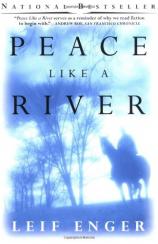Peace Like a River
Review
Peace Like a River
Reuben Land's father Jeremiah performs miracles. To borrow a phrase from Reuben, narrator of Leif Enger's debut novel PEACE LIKE A RIVER, "Make of that what you will." It's an undisputed fact as far as Reuben is concerned and a key part of his story about his family's quest to find his fugitive older brother, Davy. Reuben, now an adult, looks back on his 11th year, telling his story self-consciously, self-deprecatingly and with a sense of wonder appropriate to this story in which the miraculous and the mundane are woven together seamlessly.
Davy breaks out of jail and goes on the run after killing two boys who molest his girlfriend, briefly kidnap his little sister, Swede, and invade the family's home. Jeremiah, Reuben, and Swede set off to find him and are doggedly pursued by a federal agent intent on bringing in Davy.
Despite Jeremiah's special relationship with God, the dicey moral underpinnings of the family's journey are at the heart of PEACE LIKE A RIVER. Are they searching for Davy to save him from the law or to turn him in? Davy's killing of the two boys is not an unquestionably noble act, leaving Jeremiah to navigate tricky moral terrain as he and his other children travel West. Swede also wrestles with the moral questions of the situation. A gifted writer at 9 years old, Swede composes epic poems of the American West starring the heroic Sunny Sundown and the villainous Valdez. Early in Reuben's tale, Sunny is the typical white-hatted lawman and Valdez the wily and murderous outlaw. But as the search for Davy continues, a shift in Swede's poetry demonstrates that the moral complexity of the situation is not lost on her. Sundown's white hat is dirtied, and Valdez's evil is tempered, just as Davy's situation cannot be rendered in black and white.
Another puzzle central to PEACE LIKE A RIVER is the nature of Jeremiah's miracles. While Reuben realizes the reader may doubt him, it is clear that he has complete confidence in the supernatural nature of several events he witnesses. However, he does struggle to understand the purpose or fairness of some of Jeremiah's deeds. For example, Jeremiah heals his former employer after being unjustly fired, but does not cure Reuben's asthma, an affliction that threatens his life. Revealing more about the miraculous events in PEACE LIKE A RIVER would give away too much of the plot, but Enger's handling of them is noteworthy because they are not employed merely to provide moral clarity or to gloss over difficult plot points. Rather, they add layers of complexity to what at first glance might seem a simple story.
Reuben's engaging voice keeps this story moving as he portrays people and events in a vivid, talky manner. Occasionally, his tendency to address the reader directly is a bit jarring; on the other hand, it also draws the reader into the narrative, breaking down some of the traditional distance between narrator and reader, an essential device for substantiating the story's miracles.
Enger has crafted a moving story and placed it in the mouth of a refreshingly open and candid narrator. The story of Reuben Land's extraordinary family is not to be missed.
Reviewed by Rob Cline on January 22, 2011
Peace Like a River
- Publication Date: August 20, 2002
- Genres: Fiction
- Paperback: 320 pages
- Publisher: Atlantic Monthly Press
- ISBN-10: 0802139256
- ISBN-13: 9780802139252










